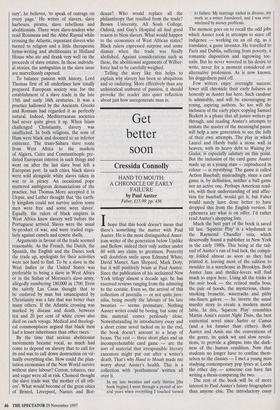Get better soon
Cressida Connolly
HAND TO MOUTH: A CHRONICLE OF EARLY FAILURE by Paul Auster Faber, £15.99, pp. 436 Ihope that this book doesn't mean that there's something the matter with Paul Auster. He is the most distinguished Amer- ican writer of the generation below Updike and Bellow, indeed their only author under 60 with any claim to greatness. Posterity will doubtless smile upon Edmund White, David Mamet, Sam Shepard, Mark Doty, but it will positively beam at Paul Auster. Since the publication of his acclaimed New York trilogy almost a decade ago, he has received reviews ranging from the admiring to the ecstatic. Even so, the arrival of this collection of juvenilia — or not quite juve- nilia, being mostly the labours of his late twenties — seems premature. Nothing Auster writes could be boring, but some of this material comes perilously close. Notwithstanding its introductory essay and a short crime novel tacked on to the end, the book doesn't amount to a heap of beans. The rest — three short plays and an incomprehensible card game — are the sort of material that irresponsible literary executors might put out after a writer's death. That's why Hand to Mouth made me worry about Auster's health. This is a collection with 'posthumous' written all over it.
In my late twenties and early thirties [the book begins] I went through a period of sev- eral years when everything I touched turned
to failure. My marriage ended in divorce, my work as a writer foundered, and I was over- whelmed by money problems.
The memoir goes on to recall the odd jobs which Auster took in attempts to stave off indigence — working on an oil rig, as a translator, a game inventor. He travelled to Paris and Dublin, suffering from poverty, a romantic disposition and ingrowing toe- nails. But he never wavered in his desire to write, never for a moment considered an alternative profession. As is now known, his doggedness paid off.
Few writers enjoy overnight success; fewer still chronicle their early failures as honestly as Auster has here. Such candour is admirable, and will be encouraging to young, aspiring authors. So too will the inclusion of the early plays: copying Samuel Beckett is a phase that all junior writers go through, and reading Auster's attempts to imitate the master of the meaningful pause will help a new generation to see the folly of their own attempts. The play in which Laurel and Hardy build a stone wall in heaven, with its heavy debt to Waiting for Godot, is especially salutary on this point. But the inclusion of the card game Auster made up as a young man — reproduced in colour — is mystifying. The game is called Action Baseball; misleadingly, since a card game is, by definition, neither a ball game nor an active one. Perhaps American read- ers, with their understanding of and affec- tion for baseball, would get it, but Faber would surely have done better to have dropped this from the English version. If ephemera are what is on offer, I'd rather read Auster's shopping lists.
Much the best part of the book is saved till last. 'Squeeze Play' is a whydunnit in the Raymond Chandler vein, which deservedly found a publisher in New York in the early 1980s. This being at the tail- end of Auster's run of bad luck, the compa- ny folded almost as soon as they had printed it, leaving most of the edition to moulder in a warehouse in Brooklyn. Both Auster fans and thriller-lovers will find much to enjoy here. Using all the tricks in the noir book — the retired mafia boss, the pair of hoods, the mysterious, chain- smoking brunette, wisecracks and pithy one-liners galore — he inverts the usual murder story to create a modern moral fable. In this, 'Squeeze Play' resembles Martin Amis's recent Night Train, the best existential novel since Sartre or Camus (and a lot funnier than either). Both Auster and Amis use the conventions of the genre, its quick wit and slow revela- tions, to provide a glimpse into the dark- ness of the human condition. Now that students no longer have to confine them- selves to the classics — I met a young man studying contemporary pop lyrics at Leeds the other day — someone can have fun writing a thesis comparing the two.
The rest of the book will be of more interest to Paul Auster's future biographers than anyone else. The introductory essay does contain a few eccentric characters, but characters without a story look very self- conscious. There's a woman who tips beer over her boyfriend's head, a fat Fundamen- talist, a sadly eloquent drunk: all grist to the novelist's mill, but insufficient enter- tainment in themselves. His novels Moon Palace and Mr Vertigo in particular — are original, touching and funny. Let's hope nothing ails him, so that he can pro- duce more such mature, wise, delightful work.



















































































 Previous page
Previous page